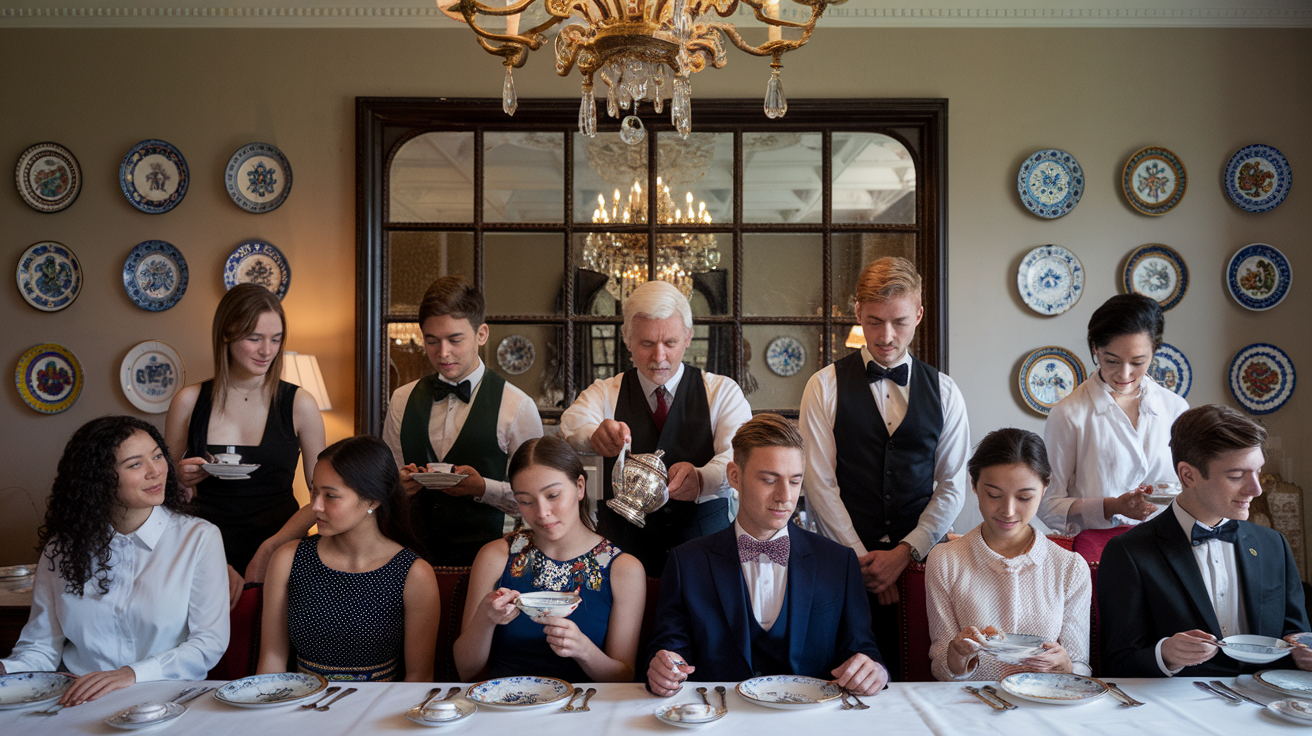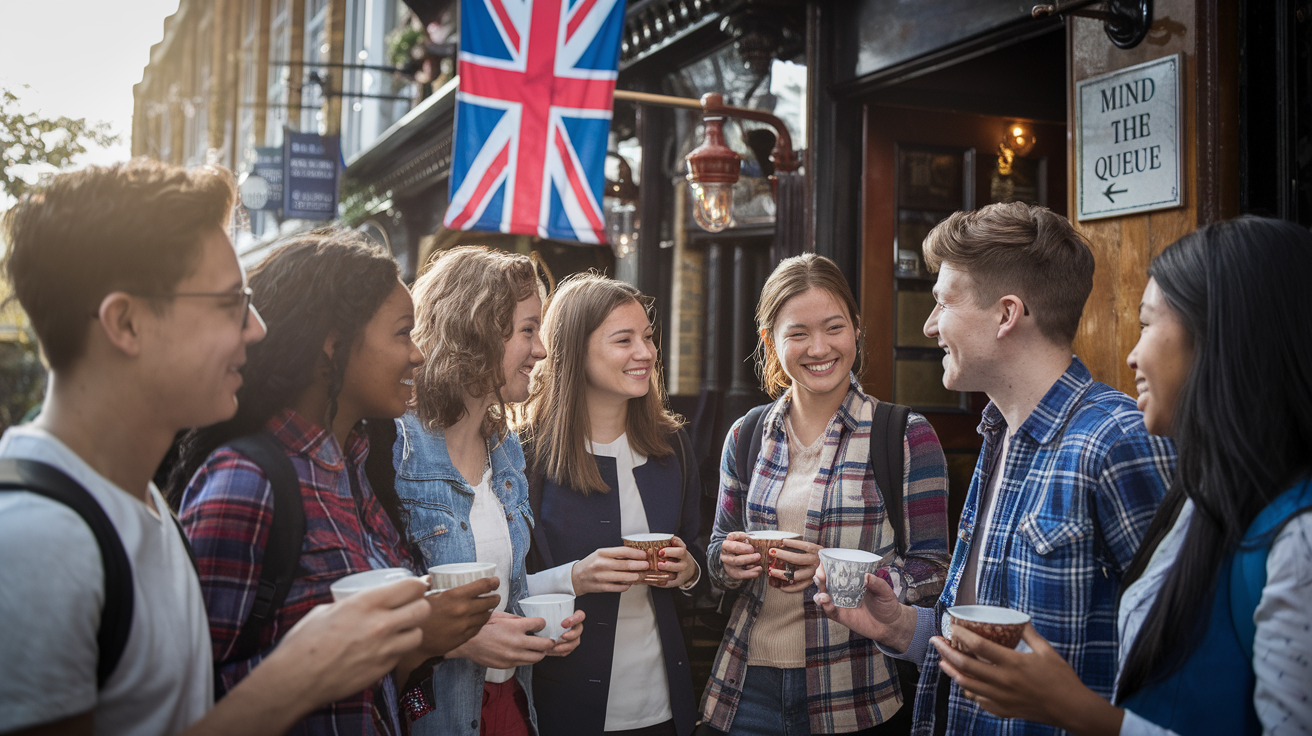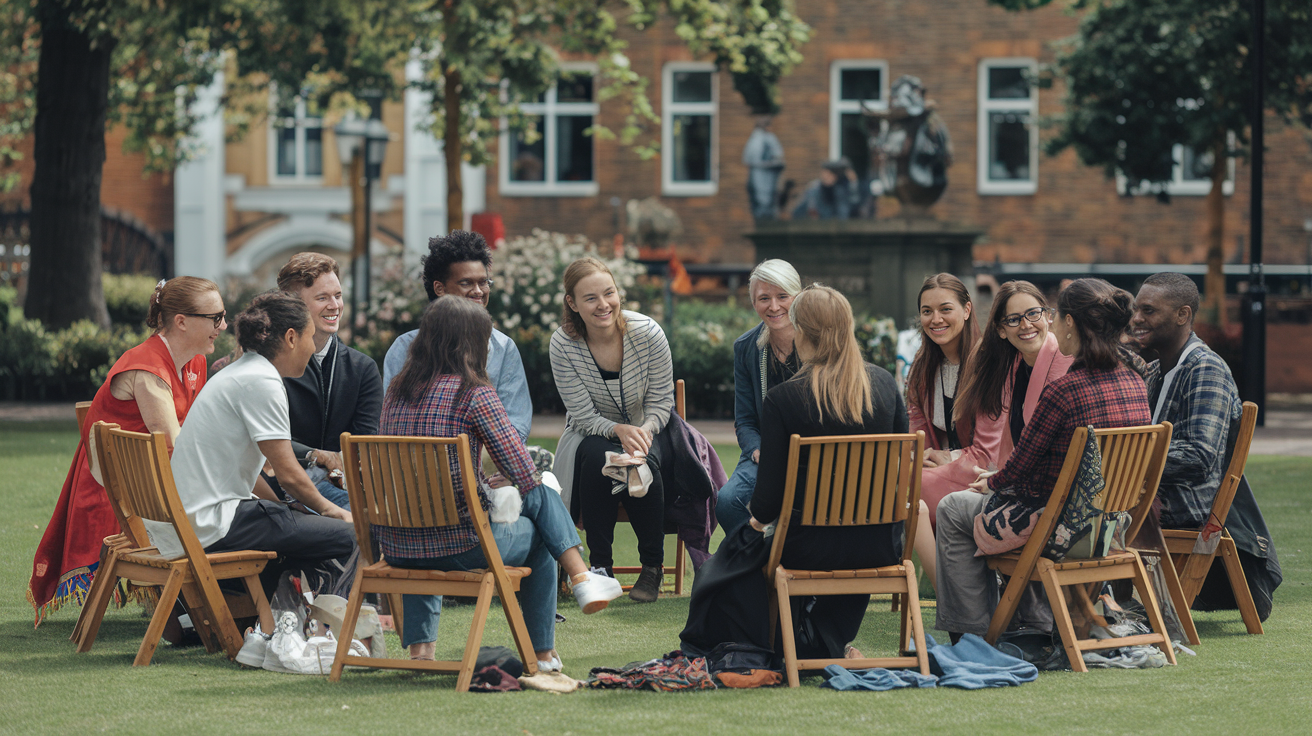Picture this: You’ve just landed in the UK, ready to embark on your exciting journey as an international student. 🛬 The air is crisp, the streets are bustling, and you’re brimming with anticipation. But suddenly, a wave of uncertainty washes over you. How do I greet people? What’s considered polite here? Am I accidentally offending someone? 😰
Don’t worry, you’re not alone! Navigating cultural etiquette in a new country can be daunting, but it’s also an essential part of your study abroad experience. Understanding the do’s and don’ts of British culture can make the difference between awkward encounters and smooth sailing through your academic journey. 🚀
In this guide, we’ll walk you through the ins and outs of cultural etiquette in the UK. From mastering social graces to respecting British customs, we’ve got you covered. We’ll explore communication norms, academic expectations, and even the unwritten rules of public transport. So, buckle up and get ready to become a pro at British etiquette – your key to making the most of your time in the UK! 🇬🇧✨
Mastering Social Etiquette

Greeting customs in the UK
In the UK, greetings are typically reserved and polite. A firm handshake with eye contact is the standard for formal introductions. In casual settings, a simple “Hello” or “Hi” suffices. Avoid hugging or kissing unless you’re close friends. Remember, the British value personal space.
Personal space and physical contact
Brits generally maintain a larger personal bubble compared to many other cultures. Here’s a quick guide:
- Arm’s length: Ideal distance for conversations
- Minimal touching: Avoid unnecessary physical contact
- Queuing: Respect the sacred British queue and maintain distance
| Situation | Appropriate Distance |
|---|---|
| Formal | 1.2 – 1.5 meters |
| Casual | 0.8 – 1.2 meters |
| Friends | 0.5 – 0.8 meters |
Punctuality and time management
Punctuality is highly valued in British culture. Being on time shows respect for others’ time. Consider these points:
- Arrive 5-10 minutes early for appointments
- Inform if you’re running late
- Plan ahead for public transport delays
Table manners and dining etiquette
British dining etiquette can be complex. Here are key points to remember:
- Hold cutlery correctly: Fork in left hand, knife in right
- Place napkin on lap when seated
- Don’t start eating until everyone is served
- Finish what’s on your plate
- Rest cutlery at 4 o’clock position when finished
Now that we’ve covered the basics of social etiquette, let’s explore how to navigate communication norms in the UK.
Navigating Communication Norms

British humor and sarcasm
British humor is renowned for its dry wit, sarcasm, and self-deprecation. As an international student, understanding this aspect of communication can greatly enhance your social interactions. Here’s a quick guide to navigating British humor:
- Deadpan delivery: Brits often deliver jokes with a straight face
- Irony and understatement: Common elements in British humor
- Self-deprecating jokes: A way to show humility and approachability
| Type of Humor | Example | How to Respond |
|---|---|---|
| Sarcasm | “Lovely weather we’re having” (when it’s raining) | Smile and agree ironically |
| Self-deprecation | “I’m about as useful as a chocolate teapot” | Laugh and reassure them |
| Dry wit | “I’m not saying she’s old, but she remembers when the Dead Sea was just feeling poorly” | Chuckle appreciatively |
Polite language and phrases to use
Politeness is highly valued in British culture. Here are some essential phrases:
- “Please” and “Thank you”: Use liberally in all interactions
- “Excuse me”: When getting someone’s attention or apologizing
- “Sorry”: Often used even when not at fault, as a courtesy
Topics to avoid in conversations
While Brits are generally open-minded, some topics are best avoided in casual conversation:
- Personal finances
- Political views (unless well-acquainted)
- Royal family gossip
- Comparisons between the UK and your home country
Non-verbal communication cues
Understanding non-verbal cues is crucial in British communication:
- Personal space: Maintain an arm’s length distance
- Eye contact: Make brief, regular eye contact during conversations
- Queuing: Always join the end of a line and wait patiently
Now that you’re familiar with British communication norms, let’s explore how to respect British customs in various settings.
Respecting British Customs

Queuing culture
In the UK, queuing is more than just a way to wait – it’s a cherished cultural institution. Respect for the queue is paramount, and queue-jumping is considered a serious social faux pas. Always join the back of the line and patiently wait your turn, whether you’re at a bus stop, in a shop, or at a ticket counter.
Pub etiquette
Pubs are central to British social life, and understanding pub etiquette is crucial. Here’s a quick guide:
| Do’s | Don’ts |
|---|---|
| Order and pay at the bar | Expect table service |
| Buy rounds if in a group | Leave without buying your round |
| Tip by offering to buy the bartender a drink | Snap fingers or shout to get attention |
| Respect the “last orders” call | Get overly intoxicated or rowdy |
Tipping practices
Tipping in the UK is less prevalent than in some other countries. Here’s a general guide:
- Restaurants: 10-15% is standard if service charge isn’t included
- Taxis: Round up to the nearest pound or add 10%
- Bars: Not expected, but appreciated for exceptional service
- Hotels: £1-2 per bag for porters, £2-5 per day for housekeeping
Dress codes for various occasions
British dress codes can vary widely depending on the occasion:
- Casual: Jeans and t-shirts are fine for everyday wear
- Smart casual: Collared shirts, trousers, or smart jeans for nicer restaurants
- Business: Suits for men, smart dresses or suits for women
- Formal: Black tie events require tuxedos for men and evening gowns for women
Remember, when in doubt, it’s better to be slightly overdressed than underdressed. Now that we’ve covered British customs, let’s move on to the academic environment, where different etiquette rules apply.
Academic Environment Dos and Don’ts

Classroom behavior expectations
In UK universities, classroom etiquette is crucial for a positive learning environment. Here are some key expectations:
- Arrive on time or a few minutes early
- Raise your hand to ask questions or contribute
- Avoid interrupting others when they’re speaking
- Keep mobile phones on silent and avoid using them during class
- Engage actively in discussions, but don’t dominate the conversation
Addressing professors and staff
Proper communication with academic staff is essential:
| Title | When to Use | Example |
|---|---|---|
| Professor | For those with a professorial title | Professor Smith |
| Dr. | For staff with a doctoral degree | Dr. Johnson |
| Mr./Ms./Mrs. | For other staff members | Ms. Brown |
Initially, use formal titles unless instructed otherwise. Some may prefer first names, but wait for their invitation.
Group work and participation
UK universities emphasize collaborative learning:
- Contribute equally to group projects
- Respect diverse opinions and cultural backgrounds
- Meet deadlines and communicate proactively with team members
- Participate actively in seminars and tutorials
- Share ideas but also listen to others’ perspectives
Academic integrity and plagiarism
Universities in the UK take academic honesty very seriously:
- Always cite sources properly
- Never copy or purchase assignments
- Use plagiarism detection software before submission
- Seek clarification if unsure about citation rules
- Understand that plagiarism can lead to severe consequences, including expulsion
Now that you’re familiar with academic expectations, let’s explore how to navigate public transport and travel etiquette in the UK.
Public Transport and Travel Etiquette

Tube and bus behavior
When using public transport in the UK, remember the golden rule: queue politely and wait your turn. On the tube, stand on the right side of escalators to allow others to pass on the left. Offer your seat to those who need it more, such as elderly, pregnant, or disabled passengers.
| Do’s | Don’ts |
|---|---|
| Queue in an orderly manner | Push or shove to get on first |
| Stand on the right of escalators | Block the left side of escalators |
| Offer your seat to those in need | Spread your belongings on empty seats |
| Keep conversations quiet | Talk loudly on your phone |
Taxi etiquette
When hailing a black cab in London, look for the illuminated “For Hire” sign. It’s customary to sit in the back unless you’re with a group. Tipping is appreciated but not mandatory; rounding up the fare or adding 10% is common.
Walking and pedestrian norms
- Keep to the left on pavements and when using stairs
- Avoid blocking the pavement in groups
- Use pedestrian crossings and wait for the green man signal
- Be aware of cyclists, especially in cities
Regional travel considerations
When traveling outside major cities, be mindful of local customs. In rural areas, it’s polite to greet passersby with a simple “hello” or nod. If using narrow country roads, be prepared to give way to oncoming traffic at passing places. When visiting small towns or villages, respect the quieter atmosphere and avoid being overly boisterous.
Now that you’re familiar with UK travel etiquette, let’s explore the importance of cultural sensitivity and inclusivity in British society.
Cultural Sensitivity and Inclusivity

Respecting diversity in the UK
The UK is a melting pot of cultures, and respecting this diversity is crucial for international students. Embrace the multicultural environment by:
- Learning about different cultures represented in your community
- Participating in cultural events and festivals
- Being open-minded and avoiding judgments based on cultural differences
LGBTQ+ awareness
The UK is generally LGBTQ+ friendly, with strong legal protections. To be an ally:
- Use inclusive language and respect preferred pronouns
- Avoid assumptions about someone’s sexual orientation or gender identity
- Support LGBTQ+ events and organizations on campus
Religious considerations
Religious freedom is protected in the UK, but it’s important to be mindful of different beliefs:
| Do | Don’t |
|---|---|
| Respect religious holidays and practices | Impose your beliefs on others |
| Ask politely about dietary restrictions | Assume everyone follows a religion |
| Be open to learning about different faiths | Mock or criticize religious customs |
Avoiding cultural stereotypes
Stereotypes can be harmful and offensive. To promote inclusivity:
- Challenge your own preconceptions about British culture and other nationalities
- Treat each person as an individual, not a representative of their culture
- Ask respectful questions to learn about others’ backgrounds
- Avoid generalizations about accents, food preferences, or behaviors
By embracing cultural sensitivity and inclusivity, you’ll enrich your UK experience and foster meaningful connections with diverse peers. Remember, cultural competence is an ongoing journey of learning and growth.

Understanding and adapting to British cultural etiquette is crucial for international students to thrive in the UK. From mastering social norms and communication styles to respecting customs and academic expectations, these insights will help you navigate your new environment with confidence. Remember to be mindful of public transport etiquette and embrace cultural sensitivity in your daily interactions.
As you embark on your journey in the UK, approach each new experience with an open mind and a willingness to learn. By respecting local customs and embracing the diversity of British culture, you’ll not only enhance your academic experience but also forge meaningful connections with your peers and the wider community. Embrace this opportunity to broaden your horizons and create lasting memories during your time as an international student in the United Kingdom.
![logo[1]](https://studynavigator.co.uk/wp-content/uploads/2025/02/logo1-e1739945985563.png)



